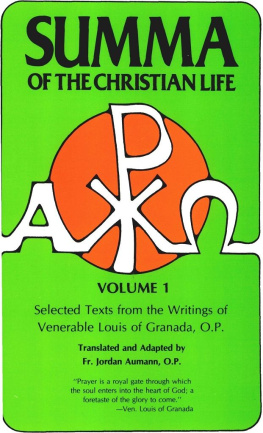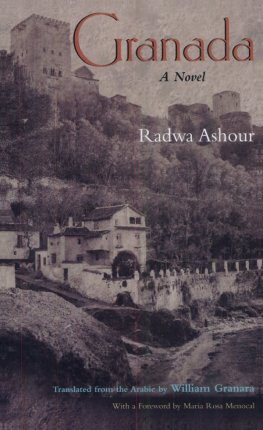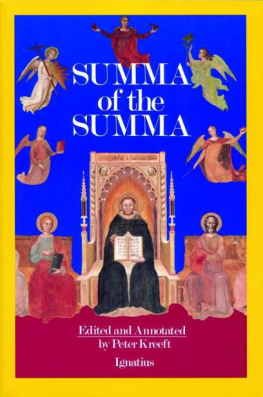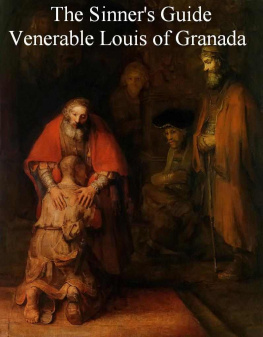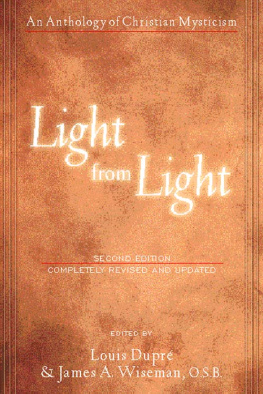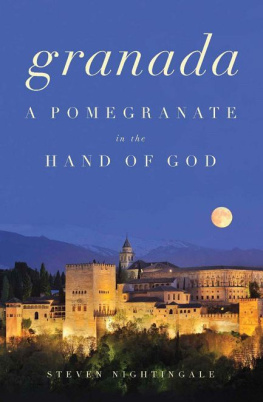Cross and Crown Series of Spirituality
GENERAL EDITOR
Very Reverend John L. Callahan, O.P., S.T.M .
LITERARY EDITOR
Reverend Jordan Aumann, O.P., S.T.D .
NUMBER 3

This translation was made from the Spanish edition of Obra Selecta: Una Suma de la Vida Cristiana , published by La Editorial Catlica, Madrid, Spain, 1947, under the auspices of the Biblioteca de Autores Cristianos.
SUMMA OF THE CHRISTIAN LIFE
SELECTED TEXTS FROM THE WRITINGS OF
Venerable Louis of Granada, O.P.
VOLUME ONE
Translated and Adapted
Jordan Aumann, O.P.
NIHIL OBSTAT:
James R. Gillis, O.P., S.T.M. James J. McDonald, O.P., S.T.B.
IMPRIMI POTEST:
Edward L. Hughes, O.P., S.T.M. Provincial
NIHIL OBSTAT:
Thomas G. Kinsella, O.P. Censor Librorum
IMPRIMATUR:
Edward A. Fitzgerald, D.D. Bishop of Winona June 1,1954
Originally published in English by B. Herder Book Co.,
St. Louis, Missouri in 1954.
Copyright 1954 by B. Herder Book Co.
Copyright 1979 by TAN Books and Publishers, Inc.
Library of Congress Catalog Card Number: 79-65716
TAN Books
Charlotte, North Carolina
www.TANBooks.com
1979
To Mary, Queen of the Most Holy Rosary
Contents 
Translator's Preface 
LOUIS OF GRANADA stands without a peer among Dominican ascetical writers and his works are known and loved throughout the Christian world. Both as a writer and a preacher he dedicated himself with apostolic zeal to the task of transmitting sacred doctrine to the common people. He is par excellence a theologian for the laity.
The Summa of the Christian Life is not a mere anthology; it represents a careful selection of passages from the works of Louis of Granada. Moreover, in order to avoid a haphazard assortment of texts, the passages have been arranged in the order of the Summa Theologica of St. Thomas Aquinas, thus giving the entire collection a theological unity.
The Spanish edition of this work was compiled by Father Antonio Trancho, O.P., of Almagro, Spain, who was the first to realize the possibility of using the masterpiece of St. Thomas Aquinas as a framework for the spiritual writings of Louis of Granada. But Father Trancho did not live to see the fulfillment of his dream; with twenty-six fellow Dominicans he gave his life for God and for Spain when he was shot down by the Communists in the early days of the Spanish Civil War. The work was completed at last by the Most Reverend Francisco Barbado, O.P., Bishop of Salamanca and a son of the Dominican Province of Btica.
The present translation is made possible through the gracious permission of Bishop Barbado and the Very Reverend Father Provincial of the Dominican Province of Btica in southern Spain. Although the original Spanish edition has been the basis of this English version, adaptations and deletions have been made with a view to the utility and benefit of American readers. The passages in the Spanish edition of the Summa of the Christian Life are taken from the critical edition of the works of Granada, made by Father Justo Cuervo, O.P., at Madrid, in 1906. For the convenience and satisfaction of the reader, the various passages which make up this Summa are identified in an appendix at the end of each volume.
J ORDAN A UMANN , O.P .
Foreword 
THE Venerable Louis of Granada is one of the writers who has contributed most to the formation of the Christian character and spirit of the Spanish people. With clarity and precision he wrote of the most exalted doctrines of Christianity. No one knew as well as he did how to combine loftiness of thought and profundity of doctrine with a clarity and transparency of style that is within the grasp of all.
If the Spanish people merit the title of a theological race, it is not only because Vitoria, Cano, Baez, and Surez were Spaniards, but because the Spaniards are interested in the theological principles that govern the Christian life and for this they are greatly indebted to Louis of Granada. Without the diffusion of his books it is hardly probable that the autos sacramentales and the theological comedies of Lpez, Lope, Tirso, and others would have enchanted the people with a poetry which today astonishes us by its profundity and theological precision. In spite of the greater human culture of our times, relatively few people are able to appreciate them.
That Louis of Granada wrote for the "wives of carpenters" was the unfortunate expression of disdain used by one who apparently had forgotten that the wife of the carpenter was full of grace and blessed among women. But the phrase that was intended to be an insult, contained within itself a lofty tribute. Even St. Paul, who wrote for those who were recently initiated in the Christian life, explained the most lofty mysteries of divine wisdom and attempted to place them within the grasp of all.
Like St. Paul, Louis of Granada aspired to bring the plenitude of the life of grace to the greatest number of souls, leading them by the hand in the ascent from virtue to virtue in their journey to the kingdom of heaven. There resounded constantly in his heart the echo of the words of the Apostle: "You are fellow citizens with the saints, and the domestics of God."
It was the selfsame pedagogy of Christ, who made use of comparisons and parables to teach people the mysteries of the kingdom of God. This was not appreciated by those who reproached Louis of Granada, as they reproached his contemporary saints and friends, St. Teresa of Avila, Blessed John of Avila, St. Francis Borgia, and Blessed John de Ribera.
The security of doctrine found in Father Granada leaves nothing to be desired nor is it necessary that one use a certain benevolence in order to give his expressions an orthodox sense. Those who are intent on finding mistakes, as a wise Master of the Sacred Palace once said, could find them even in the Pater Noster .
Moreover, Louis of Granada has the merit of combatting the spiritual exaggerations of his time, both those of the so-called intellectualists and those of the Illuminists. In much the same way, Francisco Vitoria combatted the influence of the Nominalists and the followers of Erasmus and established at Salamanca a glorious theological school. Granada, like Vitoria, possessed a brilliant intellect and a generous heart and he had mastered in an exceptional manner the great doctrinal synthesis of St. Thomas Aquinas. Louis of Granada is no eclectic; in his writings there are no affectations or adherences to the exaggerations mentioned above. He is firmly rooted in the principles of Thomistic theology and possesses a solid biblical, patristic, and metaphysical foundation.
Louis of Granada also overcame the tendencies to separate asceticism and mysticism, which were started in his day. Both aspects of the mystical life were evaluated by him and he coordinated them in such a way that both the ascetics and the mystics can look to him as a master. Undoubtedly, he gives greater emphasis to ascetical matters, for the simple reason that he directs his words in a special way to the great number of simple faithful who need above all to become enamored of virtue and holiness of life so that they will eradicate evil inclinations and rise steadily to a higher life. Granada attempted to lead souls to the threshold of contemplation and the mystical life, and because he himself lived that life intensely, his soul frequently soared to the regions of intimate communion with God and at times seems to move entirely in the planes of the mystical life.
Next page
